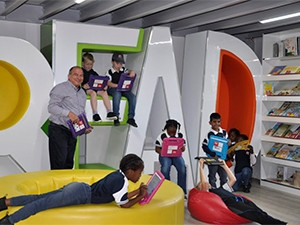
Dutch entrepreneur Maurice de Hond has brought his Steve Jobs Schools concept to SA by opening two primary schools in the country.
Steve Jobs School Sundowner is located in Randburg and Steve Jobs School Tres Jolie in Roodepoort.
"The Steve Jobs School name is only in honour of the late Steve Jobs and has no connection to Apple. We admire Steve Jobs as a catalyst of change and hope to bring some change to traditional educational models with the approach," says Liezel Botes, CEO of Steve Jobs Schools Africa.
Personalised
Equipped with personal iPads, the first 300 children in SA aged four to 13 will receive personalised education at these locations.
The two facilities are the pilot programmes for the idea outside the 12 established schools in Holland. The intention is to launch over 40 schools worldwide.
The schooling system aims to revolutionise traditional teaching methods by allowing students to learn at their own pace through what is known as an independent learning plan.
De Hond says he realised school systems still mimic models that were used 50 years ago. Instead, Steve Jobs Schools make use of the latest technologies in education, aiming to equip learners with the skills to take them into their future.
The Jobs philosophy on business, design and life revolved around self-actualisation, having the confidence to find and listen to your inner voice, and never settling, even when you had succeeded, says De Hond. He believes these pillars, along with the advantages of technology, can help learners uncover their hidden potential and use it effectively in attaining success.
These primary schools work with a school model created in the Netherlands, developing the talents and 21st-century skills of its children through personalised education using the latest educational technology and teaching resources.
De Hond wants to use the creative philosophies that made Apple one of the most innovative and successful companies in the world, to revolutionise the traditional method of classroom teaching through embracing technology to give students the freedom to learn at their own pace.
The schools do not work with traditional grades where children are grouped together based on their age. Instead, learners follow classes that are suited to their individual level, based on their individual development plan, which gets evaluated and revised on a six-weekly basis by the children, their personal coach and their parents.
"We believe that children of the same age almost always have different abilities and are on different 'levels' in 'subject areas'. The Steve Jobs School model was designed so that faster learners can go ahead while slower learners can work at their own pace, especially in subjects such as maths and languages," says Botes.
"Nobody needs to wait for the other which takes away pressure and unnecessary stress for children. With tools such as adaptive maths programmes, teachers are enabled to track learner progress and assist those who need help without holding up an entire class."
Cognitive subjects
Based on the individual development plan, a personal teaching schedule is created for each learner, with activities for the children to choose from. Their daily schedule consists of workshops on various topics, as well as support and instructions by subject specialists. In addition, learners spend a part of their school day independently training in the cognitive subjects, using challenging adaptive programs and apps.
The first Steve Jobs School opened in 2013 in the Netherlands. By the end of this year, around 8 000 learners at 40 Steve Jobs Schools will be preparing for their post 2030 professional lives based on this school model.
"The Steve Jobs concept will be bringing first world education to South African classrooms and develop learners who are self-sufficient and thinking outside the box," says Botes.
"In our schools, the children are willing and responsible participants in their own education. They are learning to be independent and make informed choices. Our aim is to produce creative thinkers and problem-solvers who are equipped with real-life 21st century skills."
Share